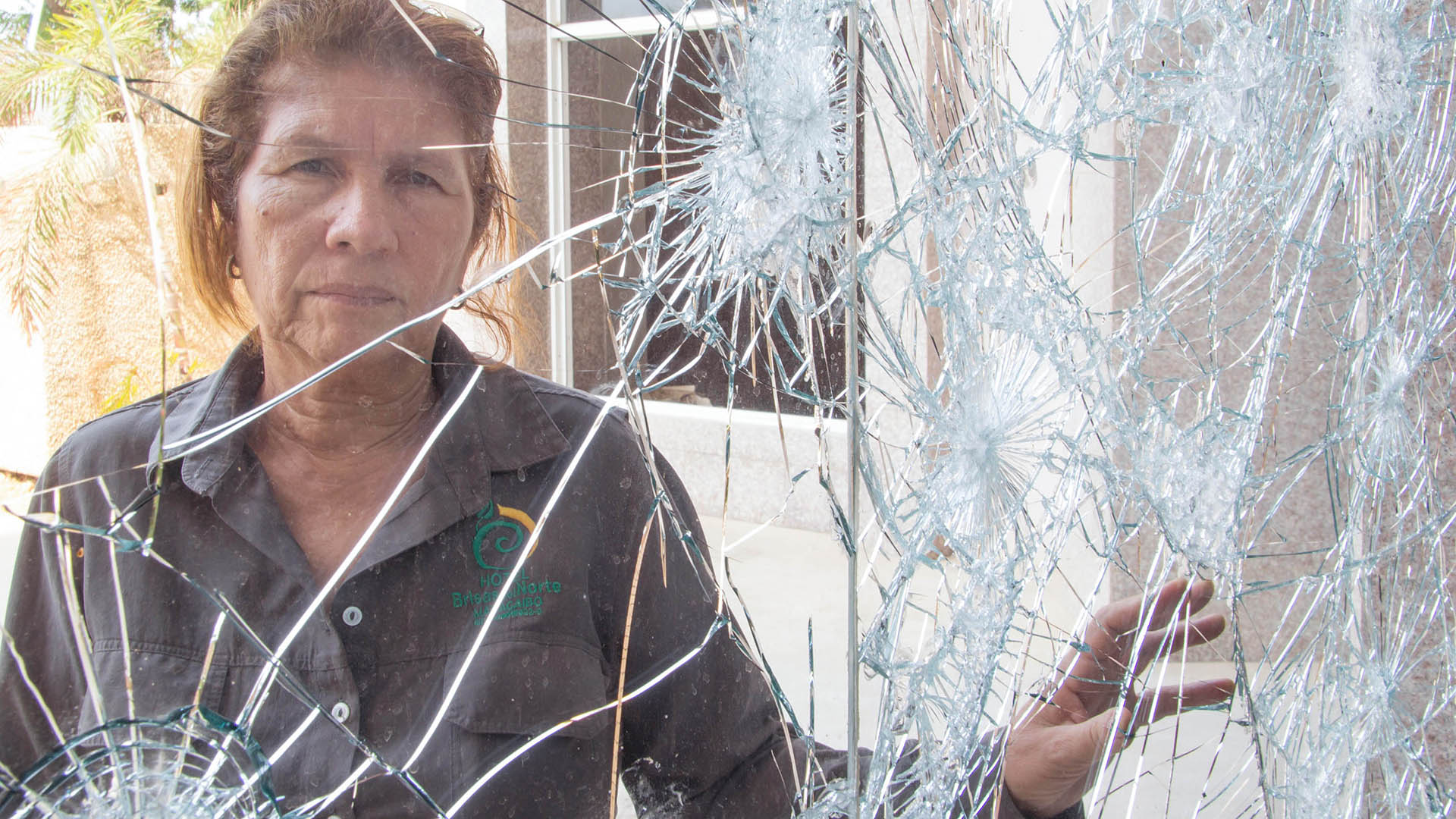

As if they were replicas of an earthquake, the general blackout of the first days of March was followed by a looting spree in Maracaibo that left approximately 500 shops with basically no chance to recover. The Brisas del Norte Hotel, which is located in a neighborhood with the same name, was one of them. Odalis Vergara, its managing director, did everything she could to prevent this. However, in the absence of help from law enforcement officials, she had no choice but to watch how 22 years of work were destroyed right in front of her eyes as she stood on a nearby bridge.

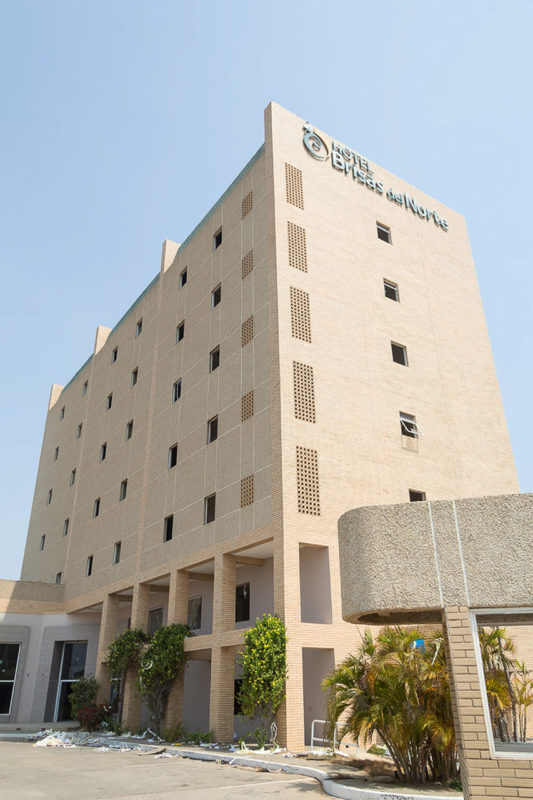 Pictures: Fernando Bracho Bracho
Pictures: Fernando Bracho Bracho
On Wednesday March 13, 2019 the sun didn’t shine the same way on the reception, the lobby, or the rooms of the Brisas del Norte Hotel, which is nestled between the zinc roofs and sandy streets of the neighborhood that goes by the same name, at the north part of Maracaibo. The light couldn’t be the same. Not for Odalis Vergara who, on the previous day, saw her work of 22 years destroyed in just a matter of minutes.
On Tuesday, as usual, the 60-year-old woman arrived at 7:00 a.m. to begin her routine as managing director of a hotel owned by her two close friends, an enterprise she helped to launch. Right from the start, that day seemed as though it would be very different from any other: there were no guests and it was the fifth day that they had gone without electric power as a result of the nationwide blackout that had brought the entire country to a disconcerting halt. But even then, this was nothing that couldn’t be forgotten with enough time. What would happen a couple hours after, however, was entirely different. The date would be burnt into her memory forever.
The morning was marked by a single conversation topic between her and the 14 employees that showed up that day: Maracaibo’s darkness and the amount of people that had arrived to request a room the night prior, thinking that the hotel owned a generator that would allow them to sleep with air conditioning, something vital in a city that can have a temperature up to 40 degrees Celsius, or around 104 °F. Odalis said that she had rejected even those who had insisted in staying anyway. She couldn’t allow people to sleep in her hotel in those conditions and certainly not if she wasn’t able to offer them the hotel’s usual four star service.
They talked in the indoors restaurant while they waited for breakfast. Seeing the sinuous shape of the pool outside, surrounded by trees, cheered them up. That is, until the lady who had been tasked with looking for the ingredients to prepare some sandwiches walked approximately 50 meters towards the outdoors storage room and found herself witness of a scene that would scare her to the bone.
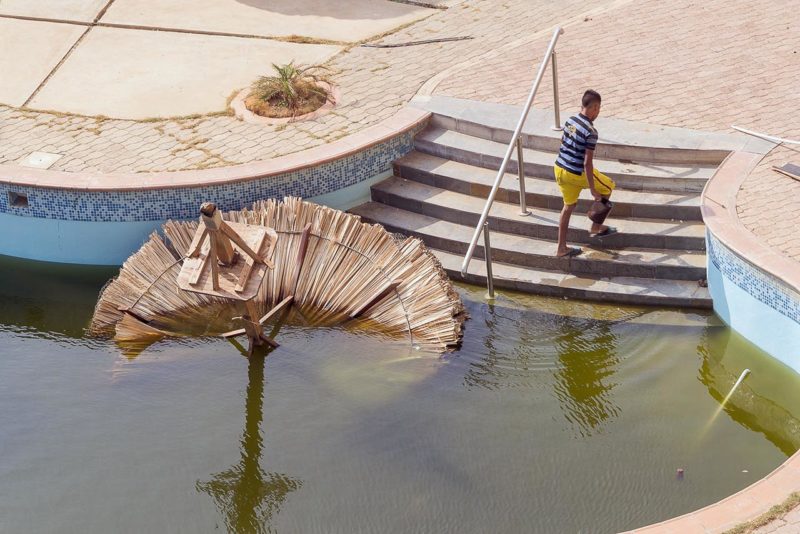
Around 10 men had invaded the recreational complex, made up by the hotel and an area of 24 trailer-shaped rooms, a restaurant, a pizza shop and a children’s park. The small mob scurried between the trailers with the intention of looting them. It was a mass of bodies that run covered in sweat, fueled by rage. They had broken in after demolishing a section of the brick wall adjacent to a gully.
The employee tried to alert the others. The smell of coffee was replaced by an intense sense of danger. A memory rushed to the front of Odalis’ mind, something they had told her the day before.
“Don’t let your guard down, lady. We’re getting in anyway.”
The threat came from a person in a crowd passing by in front of the hotel after having looted a nearby Pepsi factory. No place in the city had been spared. The Chamber of Commerce in the capital city of the state of Zulia would later count a total of 500 establishments looted between Monday and Tuesday. Food stores, pharmacies, home appliances stores, and even entire malls had had the same fate.
Even so, Odalis thought they were empty words. Why would they loot a hotel? It was frequent for law enforcement officers to arrive at the hotel’s bar for a drink. That camaraderie, forged through the years, made her think that nothing would happen. That law enforcement agents would be there if the outlaws tried to get in.
However, she was feeling uneasy.
Her first instinct was to go to the Third Regional National Guard Command Post, not too far from there. When she walked through the hotel’s exit gate, she saw that the crowd was getting bigger. It was 9:00 a.m.
There, the only thing that the officers did was to tell her where she could find the motorbike patrol group that had just left. When she managed to intercept the squad in full riot gear, the officer in charge promised that they would go immediately there to confront the hotel raiders, but that never happened. Or, at least, she never knew if they did. The squad would, instead, head towards the nearby Makro, a wholesale market that had been vandalized the day before. A team from the Strategic Region of Integral Defense of the Armed National Forces was assessing the damage. The only thing remaining in the facilities was the price posters. They had even taken a section of the ceiling.
Odalis followed them, insisting that they needed help back at the hotel, but they wouldn’t let her through. In her mind, a movie was playing where the 85 rooms of the five story hotel were being occupied, one by one, by the mobsters. And she started to panic.
An officer agreed to talk to her. With his martial posture, high stature and stern voice, he looked like he wanted to reassure her, to make her feel safe.
“Calm down!”, he said. “We will take control of the situation!”
Calming down slightly, she imagined that her attempts to get help wouldn’t be in vain, that she would be back with the National Guard and they would kick out the assailants. Only then, she walked back to the hotel.
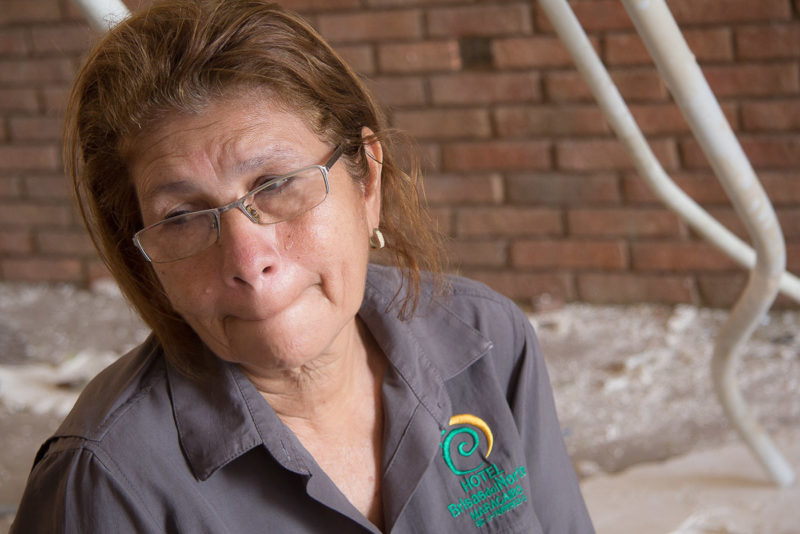
She found a small tank of the National Guard on the tin bridge that crossed the gully and allowed access to the hotel. She kept close, not crossing the bridge, watching every move.
Suddenly, gunshots were heard. She cheered up, thinking the guards were finally fighting the thieves. She watched the scene the way a mother looks at her son fighting for survival, with a mix of anguish and hope. But something was amiss. She could feel it.
Gunshots. Silence. Gunshots. Screams. Gunshots. And the military vehicle was still in the middle of the bridge, not moving. There were no officers coming from it, nor were there any around. Reinforcements were not arriving. Gunshots, again. Who was shooting? Odalis would never know.
Scared, disconcerted, the woman looked at the hotel’s facade, which was impeccably painted in beige, and she surrendered herself to the idea that her business of over two decades was at the complete mercy of its invaders.
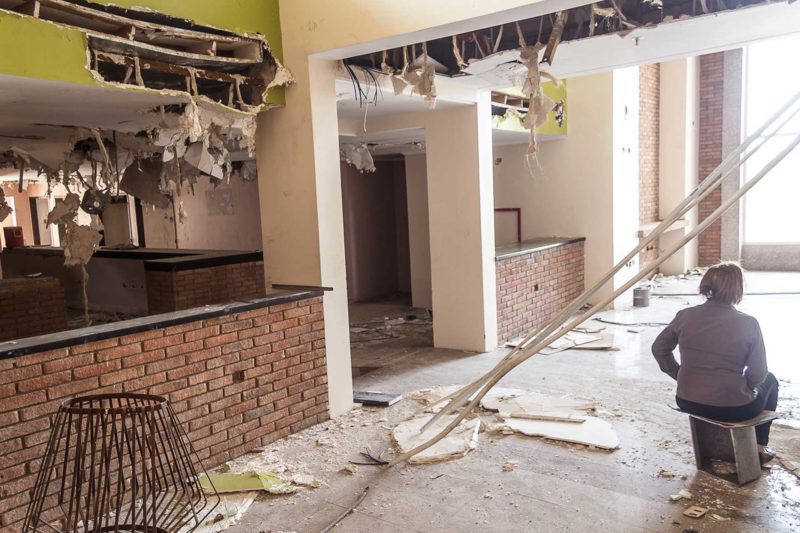
Yes, it was the same project that seemed utopic at first, when her two bosses showed her the draft. She was their right hand, an invaluable asset for them. They were planning on building the hotel in an area where there were only undergrowth and bushes. It was a place without any touristic appeal and with a glaring flaw: the terrain was in the middle of a slum area. Businessmen and merchants alike said, unanimously, that it was an insane plan.
“This is why slums don’t improve: they are not given the chance”, she heard her bosses respond. “We have to help clean up their mentality, bet for this to be a source of jobs, a place where schools and people can have somewhere to celebrate.”
Odalis convinced herself that it would work. Just like them, she wanted to destroy the stigma people had about poor neighborhoods. They began with 48 trailers conditioned as rooms for truck drivers and gained popularity very quickly. Then, they took a chance with something bigger: a five story building to host executives and families from all over the country, even foreigners from Colombia.
The Economic and Social Development Bank of Venezuela (Bandes) rejected their loan application three times between 2000 and 2002. There were small, but many, problems with the paperwork, meaning that the building process was not an easy one. They only got financing for a part of the hotel, the other would have to come from their own pockets. In 2010, after the inauguration, they found themselves with no money to pay their employees. And through every complication there was Odalis, full of optimism and confident in the bright future ahead.
She prayed day and night to find solutions. She even made her promises to God, pleading that her requests were solved quickly.
The time spent with the community of Brisas del Norte made her feel safe. She was never afraid of vandalism or getting mugged. She was always happy to see the neighboring families spend their weekends at the pool. Odalis, born in Colombia, didn’t have any children of her own, but she filled her life with meaning by helping raise three nephews and taking care of the hotel.
They started with 12 employees. The group kept growing until they got to the 60 workers she had in her payroll that Tuesday, March 12, mostly residents of Brisa del Norte.
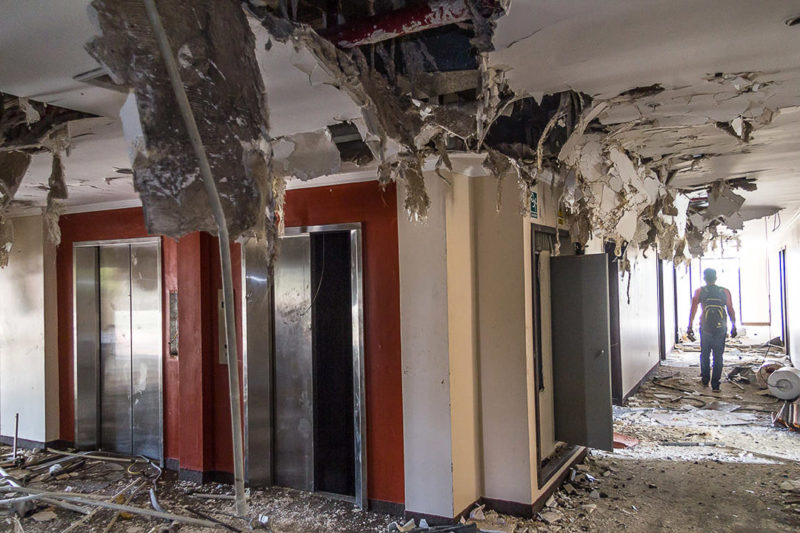
There were only two employees inside the hotel while the looting was taken place, including Leonardo Pinzón, one of the other directors. Just feet away from the bridge, and unable to do anything, Odalis was shaking from the thought of something bad happening to them.
Sometime after 10:00 a.m. both employees managed to escape through the backyard of a house, and that’s when Odalis was able to talk to Leonardo.
“Did they get to the bar?”, she asked.
“They got everywhere.”
“And in the pool?”
“Yes. There’s more than 100 people.”
Some of the palm umbrellas had been detached and were askew on the concrete floor. One of them floated on the water like a sad, orphaned boat.
“Is there anything left?”, Odalis wanted to know, looking for something to hold on to.
“They’re not leaving anything behind.”
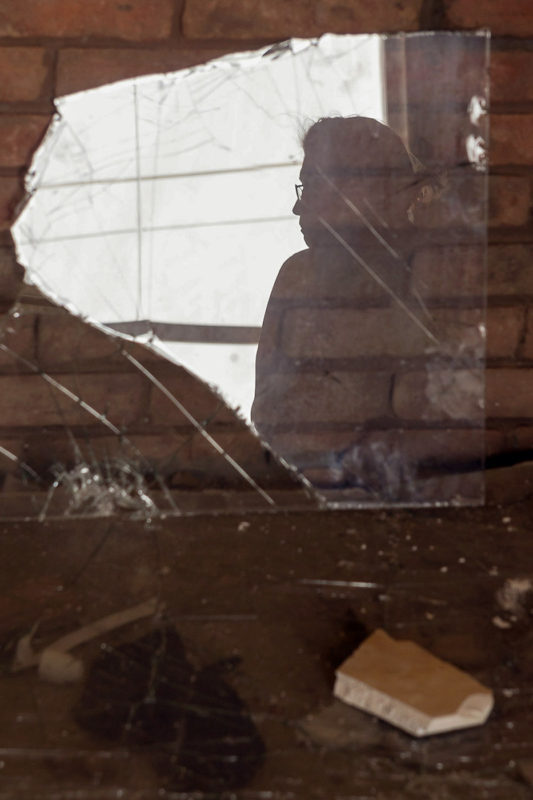
The comments and videos she was getting from the neighbors through WhatsApp discouraged her even more. She wanted to run and stop what was happening. To stand firmly and face the mob.
No authority arrived at the Brisas del Norte Hotel. The small tank didn’t move from the bridge. At 2:00 p.m. Odelis turned around, defeated, and headed home. She felt as though she had a thick knot stuck in her throat.
On the next morning, she hoped to arrive and find out that they had only taken the furniture. But what she saw made her feel like she wasn’t in the right place, that she had arrived at a devastated hotel in Siria, in Afghanistan. Every inch had been swept away.
Sections of the plaster ceiling dangled like shapeless lamps. Broken glass from the windows was all over the floor. The marble tables had no marble. Carpeted floors had no carpet. Doors had holes where the smart locks used to be. Water heaters had been thrown in the middle of hallways. Elevators had been tampered with. There were bathroom pieces on the stairways. ountains of papers piled up in each corner.
That was not the hotel Odalis ran.
Crying became an uncontrollable impulse. Her crying was mixed with yelling, anger, powerlessness. Odalis couldn’t understand how so many years of hard work had disappeared in less than 24 hours.
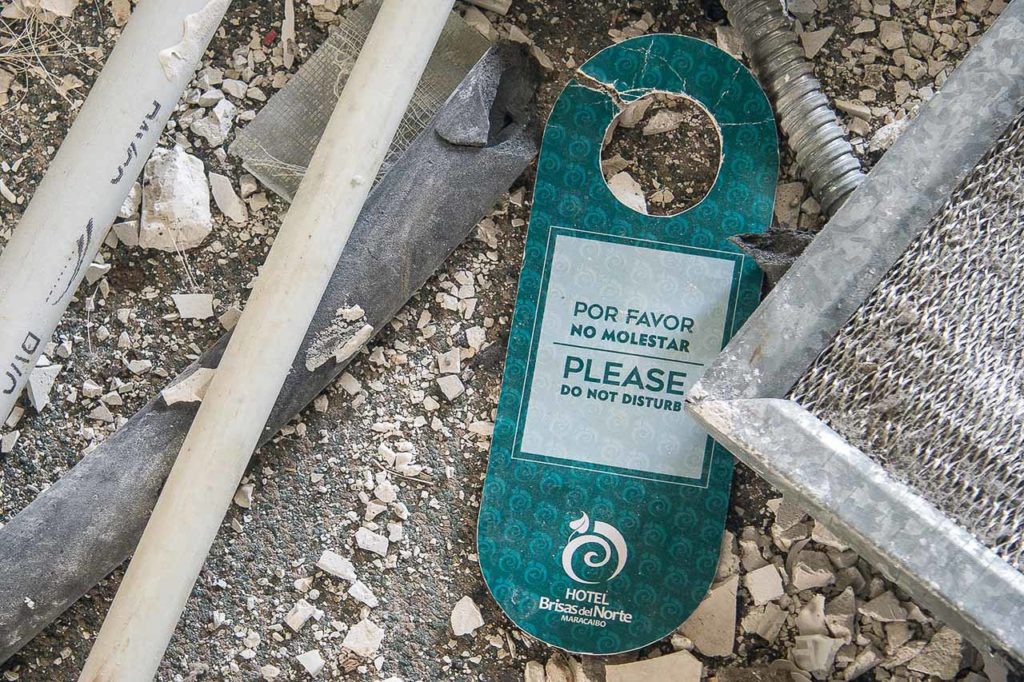
It’s been two weeks now and the same questions haunt her: why and who could’ve done all that? While she tells her story, Odalis looks at one of the windows in the front of the hotel. The glass has 17 stone impacts. She’s entranced recounting everything.
“I was sure that we could stop them… that they would help us”, she says, composing herself.
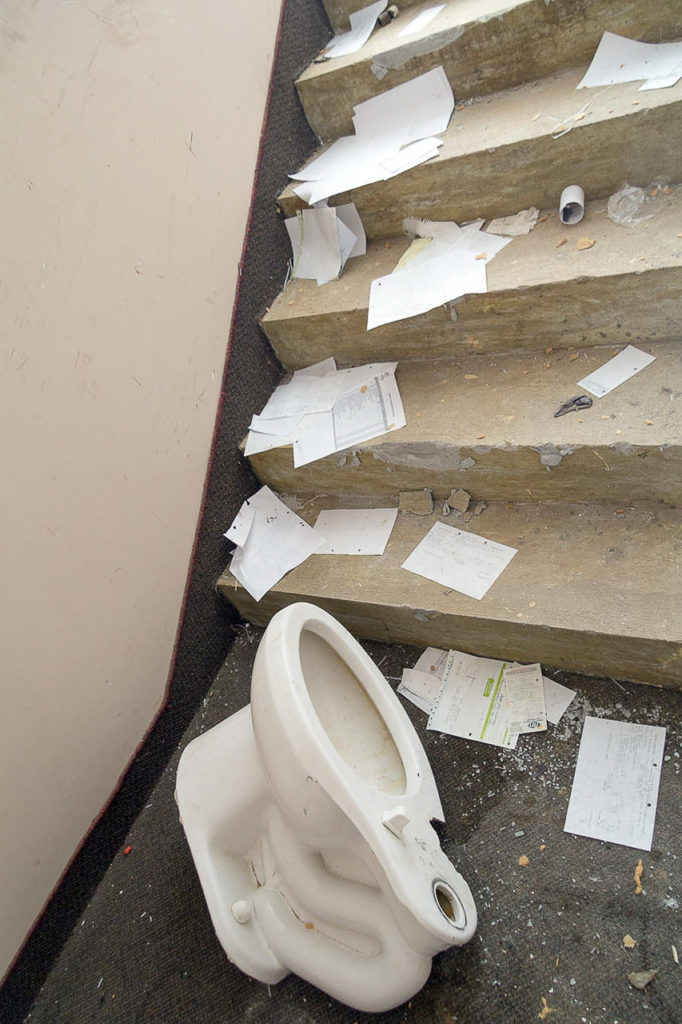
She’s wearing a grey shirt identified with the hotel’s name, black pants and a pair of brown shoes.
Another tear escapes her.
The situation was so overbearing that she had a breakdown and needed to be hospitalized for several hours.
To this day, it is unknown where the looters were from, or how they took air conditioning units that weighed tons without being seen, or how they knew where the water shut-off valves were located to close them and dismantle the bathrooms. She doesn’t want to come up with theories that would make her suffer more.
Not a single one of the looters has been detained. No government entity has communicated with them to know of their situation.
And yet, she has been going back to the hotel every single day. She doesn’t know what for. Of the two owners, only one has had the strength to visit once, enough to never return. The other, suffering from Parkinson’s disease, hasn’t even seen the place; Odalis fears that the impact will worsen his condition.
“They left us with nothing to get back up again”, she repeats to herself. “Besides, if we didn’t get any protection when we needed it the most, where do we look for it now?”.
Translation: Néstor Linares / Edited by: Yazmine Livinalli
1837 readings
“I think with my fingers, armed with 27 letters.” I am a bachelor of communication and media from the University of Zulia. I write about the stories that, every single day, erupt from a sometimes implausible reality.